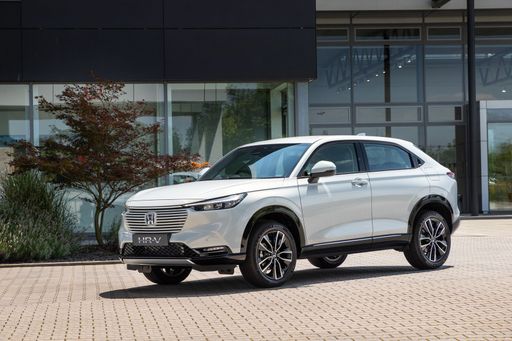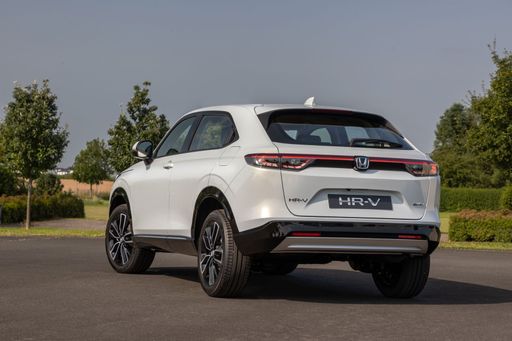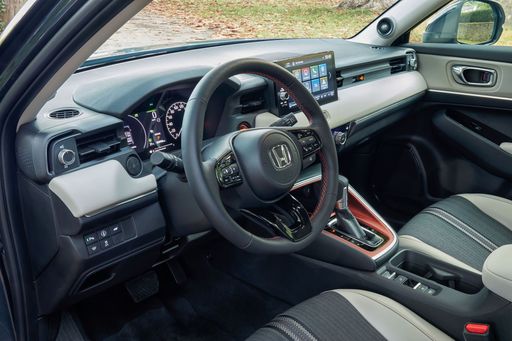Honda HR-V vs Toyota C-HR - Differences and prices compared
Compare performance (131 HP vs 223 HP), boot space and price (29700 £ vs 29100 £ ) at a glance. Find out which car is the better choice for you – Honda HR-V or Toyota C-HR?
Costs and Efficiency:
When it comes to price and running costs, the biggest differences usually appear. This is often where you see which car fits your budget better in the long run.
Toyota C-HR has a slight advantage in terms of price – it starts at 29100 £ , while the Honda HR-V costs 29700 £ . That’s a price difference of around 608 £.
Fuel consumption also shows a difference: Toyota C-HR manages with 0.80 L and is therefore clearly more efficient than the Honda HR-V with 5.40 L. The difference is about 4.60 L per 100 km.
Engine and Performance:
Power, torque and acceleration are the classic benchmarks for car enthusiasts – and here, some clear differences start to show.
When it comes to engine power, the Toyota C-HR has a decisively edge – offering 223 HP compared to 131 HP. That’s roughly 92 HP more horsepower.
In acceleration from 0 to 100 km/h, the Toyota C-HR is convincingly quicker – completing the sprint in 7.40 s, while the Honda HR-V takes 10.60 s. That’s about 3.20 s faster.
In terms of top speed, the Toyota C-HR performs minimal better – reaching 180 km/h, while the Honda HR-V tops out at 170 km/h. The difference is around 10 km/h.
Space and Everyday Use:
Beyond pure performance, interior space and usability matter most in daily life. This is where you see which car is more practical and versatile.
Both vehicles offer seating for 5 people.
In curb weight, Honda HR-V is hardly perceptible lighter – 1452 kg compared to 1505 kg. The difference is around 53 kg.
In terms of boot space, the Toyota C-HR offers clearly perceptible more room – 447 L compared to 319 L. That’s a difference of about 128 L.
In maximum load capacity, the Honda HR-V performs a bit better – up to 1289 L, which is about 134 L more than the Toyota C-HR.
When it comes to payload, Toyota C-HR barely noticeable takes the win – 425 kg compared to 418 kg. That’s a difference of about 7 kg.
Who wins the race in the data check?
The Toyota C-HR holds a decisive overall lead in the objective data comparison.
This result only shows which model scores more points on paper – not which of the two cars feels right for you.
Costs and Consumption
View detailed analysis
Engine and Performance
View detailed analysis
Dimensions and Body
View detailed analysis

Toyota C-HR
Honda HR-V
The Honda HR-V is the sensible compact crossover that blends roomy practicality with a composed, friendly drive, making it an easy pick for buyers who want everyday usability without fuss. It won’t thrill hardcore enthusiasts, but its clever packaging, comfortable cabin and low-key styling make life simpler — and that’s exactly the point.
details



Toyota C-HR
The Toyota C-HR cuts a striking figure with its angular styling and coupe-like profile, so you’ll never go unnoticed in the supermarket car park. It balances everyday practicality with a nimble, city-friendly personality, making routine commutes feel a touch more fun without asking for forgiveness.
details




Costs and Consumption |
|
|---|---|
|
Price
29700 - 35400 £
|
Price
29100 - 42800 £
|
|
Consumption L/100km
5.40 L
|
Consumption L/100km
0.8 - 5.1 L
|
|
Consumption kWh/100km
-
|
Consumption kWh/100km
-
|
|
Electric Range
-
|
Electric Range
68 km
|
|
Battery Capacity
-
|
Battery Capacity
-
|
|
co2
122 g/km
|
co2
17 - 115 g/km
|
|
Fuel tank capacity
40 L
|
Fuel tank capacity
43 L
|
Dimensions and Body |
|
|---|---|
|
Body Type
SUV
|
Body Type
SUV
|
|
Seats
5
|
Seats
5
|
|
Doors
5
|
Doors
5
|
|
Curb weight
1452 kg
|
Curb weight
1505 - 1755 kg
|
|
Trunk capacity
319 L
|
Trunk capacity
350 - 447 L
|
|
Length
4355 mm
|
Length
4362 mm
|
|
Width
-
|
Width
1832 mm
|
|
Height
1582 mm
|
Height
1558 - 1564 mm
|
|
Max trunk capacity
1289 L
|
Max trunk capacity
1076 - 1155 L
|
|
Payload
418 kg
|
Payload
375 - 425 kg
|
Engine and Performance |
|
|---|---|
|
Engine Type
Full Hybrid
|
Engine Type
Full Hybrid, Plugin Hybrid
|
|
Transmission
Automatic
|
Transmission
Automatic
|
|
Transmission Detail
CVT
|
Transmission Detail
CVT
|
|
Drive Type
Front-Wheel Drive
|
Drive Type
Front-Wheel Drive, All-Wheel Drive
|
|
Power HP
131 HP
|
Power HP
140 - 223 HP
|
|
Acceleration 0-100km/h
10.6 - 10.8 s
|
Acceleration 0-100km/h
7.4 - 9.9 s
|
|
Max Speed
170 km/h
|
Max Speed
175 - 180 km/h
|
|
Torque
253 Nm
|
Torque
-
|
|
Number of Cylinders
4
|
Number of Cylinders
4
|
|
Power kW
96 kW
|
Power kW
103 - 164 kW
|
|
Engine capacity
1498 cm3
|
Engine capacity
1798 - 1987 cm3
|
General |
|
|---|---|
|
Model Year
2025
|
Model Year
2024 - 2025
|
|
CO2 Efficiency Class
D
|
CO2 Efficiency Class
C, B
|
|
Brand
Honda
|
Brand
Toyota
|
What drive types are available for the Honda HR-V?
The Honda HR-V is available as Front-Wheel Drive.




